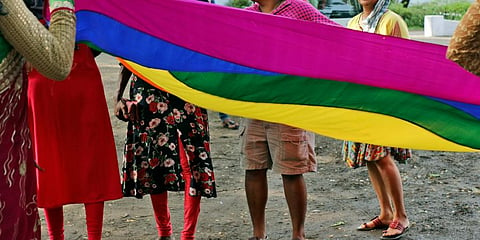

NEW DELHI: Transgenders, elderly and the disabled population had a difficult 2020 due to the coronavirus pandemic which kept the Ministry of Social Justice and Empowerment on its toes throughout the year.
While the elderly battled high susceptibility to COVID-19, transgenders and the disabled population were hit by its social repercussions.
Relegated to the sidelines of the society, many of the country's estimated 4.88 lakh transgender people are forced to make a living through begging, dancing at celebrations like weddings and sex work, according to rights groups.
But ever since the outbreak of the COVID-19 pandemic, many trans community members have lost their means of livelihood and have been struggling to earn.
They say they have been subjected to taunts, verbal abuse and domestic violence by their partners and family members in the last few months.
Meera Parida, co-founder of NGO Sakha, said, "The COVID-19 outbreak has pushed us back to those times when we were struggling to come to terms with our identity, get heard and save ourselves from life-threatening challenges."
In the context of the coronavirus pandemic, she urged the government to consider the concerns of transgenders while framing policies and strategies.
"The trans community needs the help and support of the society and the government more than ever now," she noted.
The disabled community battled the impact of the disease and also that of social distancing.
Touch, which is the most prevalent means of spreading COVID-19, is also the most prevalent method to communicate for most disabled people, especially those visually impaired.
They also struggled with e-education with lack of facilities for them like translators on the online medium.
Elderly, especially those living in old age homes, also had a difficult year due to their high susceptibility to COVID-19.
Soon after the implementation of the nationwide lockdown in March, the Ministry of Social Justice and Empowerment issued comprehensive disability inclusive guidelines to states and union territories for protection and safety of persons with disabilities (Divyangjan) in light of COVID-19.
It directed states that information about COVID-19, services offered and precautions to be taken should be available in simple and local language in accessible formats i.e. in Braille and audio tapes for persons with visual impairment, video-graphic material with subtitles and sign language interpretation for people with hearing impairment and through accessible websites.
It also directed that people responsible for handling emergency response services should be trained on the rights of persons with disabilities, and on risks associated with additional problems for persons having specific impairments.
The Centre launched a 24x7 toll free mental rehabilitation helpline for providing psychological support to people and a national toll free drug de-addiction helpline number which provided telephonic counselling and also linked callers to de-addiction centres.
The ministry is also planning separate special helplines to help the elderly and transgender community members, an official said.
The Centre constituted the National Council for Transgender Persons in August to formulate policies, programmes, legislation and projects regarding members of the community for achieving equality and full participation by them.
In November, the ministry launched a portal that allows transgender persons to apply online for certification of their self-perceived gender identity.
In September, the Transgender Persons (Protection of Rights) Act aimed at securing rights and mainstreaming of transgender persons was also implemented after the Centre notified the rules.
Amid the prevailing situation due to COVID-19 pandemic, the government organised virtual camps for distribution of aids and assistive devices to the people with disabilities.
The purpose of organising such camps is to provide direct benefit of the government run schemes in a transparent way and also to generate awareness about the various other programs and initiatives undertaken by the government of India for the persons with disabilities (Divyangjan) senior citizens across the nation.
In June, the ministry also proposed to amend the Rights of Persons with Disabilities Act 2016 to decriminalise minor offences but meeting huge opposition from NGOs it decided to not proceed with the proposal in July.
The ministry also proposed an amendment in the Rehabilitation Council of India Act 1992, saying the need for it has arisen in view of developments in the rehabilitation and education sector and invited suggestions from stakeholders on the same.
In a public notice, the ministry in December proposed that the amendment in the act will make the Rehabilitation Council of India (RCI) provide accessible, quality and affordable habilitation and rehabilitation education, regulate the conduct of such education, meet the demand of high quality professionals and personnel in all parts of the country.
The ministry also unveiled 33 action plans for 2020-21 of all the schemes of the Department of Social Justice and Empowerment.
While some issues were addressed, some remained to be dealt, especially in terms of policy interventions and on ground support to the community members who are among the most vulnerable.